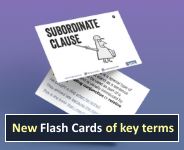Clauses: Relative clauses
Look at the highlighted clauses in these examples. What do they add to the meaning of the sentences?
- And then he ran down this alleyway so we ran as well, with the guys who were then chasing him. [S2A-050 #163]
- And the school where I teach is at the general hospital in Northampton. [S1A-082 #9]
- The 8-Series model and the engine which powered it were superbly detailed. [W2B-037 #28]
Each clause comes after a noun and gives us more information relating to that noun.
These clauses are called relative clauses because they ‘relate back’ to a preceding noun (called the antecedent).
A relative clause is a special type of subordinate clause (a clause which only functions as part of a larger structure).
Let’s zoom in on our examples:
- the guys who were then chasing him
- the school where I teach
- the engine which powered it
These relative clauses tell us which guys are being talked about, which school, which engine. Notice that each one has a special relative word starting with wh-: who, where, which.
What about the relative clauses in these examples?
- I was in Narrow Wood, which is just near Box Hill, Dorking. [S1A-081 #60]
- Last season, he was on loan to Swansea, for whom he played in the European Cup. [W2C-014 #28]
These relative clauses don’t tell us ‘which Narrow Wood?’ or ‘which Swansea?’ – those questions don’t really make sense. However, they do give more information which relates to Narrow Wood and Swansea: Narrow Wood is just near Box Hill, Dorking; he played for Swansea in the European Cup.
Some relative clauses start instead with that:
- Those batteries that you gave me lasted an hour. [S1A-085 #132]
- But you will also need to do exercise that strengthens bones. [W2B-022 #103]
Often that can be left out:
- Those batteries that you gave me lasted an hour.
- Those batteries you gave me lasted an hour.
Here are some more examples where there is no special relative word (no that or wh-word):
- That’s not the guy you were talking to. [S1A-058 #11]
- But was it in that little book you had yesterday? [S1A-053 #185]
- Why is it that everybody I interview starts discussing the equipment? [S1A-007 #191]
Relative clauses most often relate back to nouns. However, sometimes they relate back to a whole clause. What is described as being a bit sad in this example?
- So we haven’t really got very far, which is a bit sad. [S1A-008 #9]
What’s described as a bit sad here is the whole situation in which we haven’t got very far.
See if you can find the relative clauses inside these sentences:
|
Mike Heafy was a man who worked for Allied Dunbar. | |
|
And then I had the vegetarian option, which was a wonderful spinach cheese thing with good veggies. | |
|
The ninety per cent figure he keeps talking about is totally irrelevant. | |
|
That’s the part of the earth that faces the sun. | |
|
He’s probably the cleverest man I’ve ever met. | |
|
The best cheese was probably the brie at the farmhouse where we were staying. |
Welcome!

Englicious is totally free for everyone to use!
But in exchange, we ask that you register for an account on our site.
If you’ve already registered, you can log in straight away.
Since this is your first visit today, you can see this page by clicking the button below.
- Printer-friendly version
- Log in to view or leave comments

